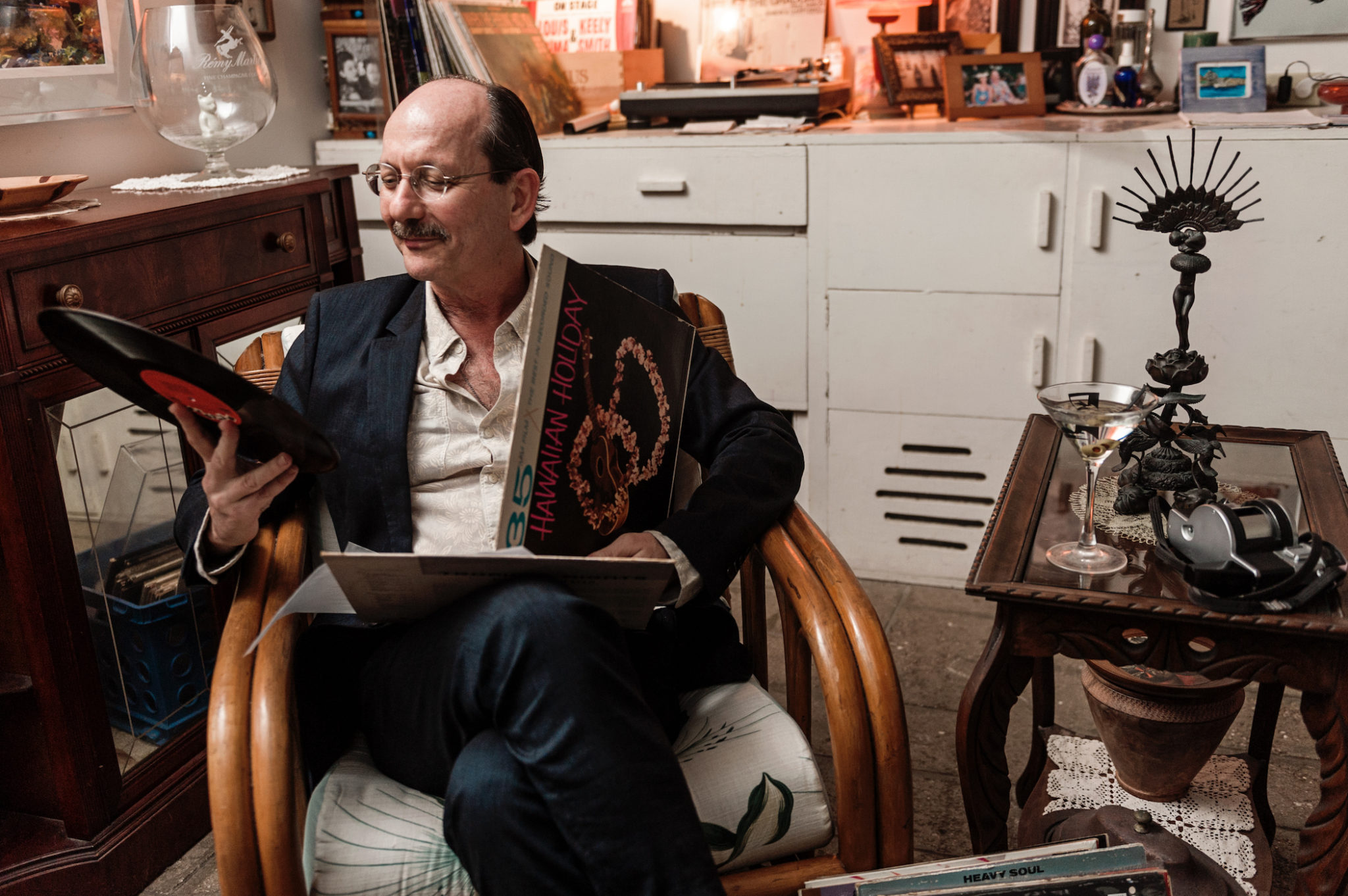Images by John Hook & Omer Kursat
Photographer and publisher Omer Kursat drinks a celebratory afternoon glass of rakı in a bar in Honolulu’s Chinatown. “It is Turkey’s national drink,” he says, raising his small tumbler. When Kursat first came to Hawai‘i in 1994, Chinatown was not where one went for an imported apéritif. Years later, there are now several spots in the neighborhood to sip such an anise-scented concoction, perfect for toasting a holiday, commiserating a breakup, or in Kursat’s case, celebrating the opening of an art show and the release of a new book. “Rakı is meant to entice conversation,” he says. “When I travel back to Turkey to visit with some friends and drink rakı, the conversation always gets really excited.” At a stiff 90-proof, it’s also helping Kursat get over a cold.
There is something lively about Kursat, messy and warm. His defined, well-groomed mustache bobs as he speaks, and his hands pantomime his enthusiasm. It might be the rakı, but Kursat is alive in conversation. “My whole life I never ever thought of myself as an immigrant,” he says. “But recently, with everything that’s been going on in the news, I kept thinking about how my father was originally from Crete and then moved to Turkey, so with that in mind, I realize now I was an immigrant before I was even born.” Kursat moved to the United States to attend the University of Southern California, where he graduated with a bachelor’s degree in computer science, and soon after, got hired as a software programmer at a bank. He worked there for eight years before coming to live in Hawai‘i with his wife, Dee. The couple rented Dee’s sister’s house in Waimānalo and have been living there ever since. “I find myself culturally displaced sometimes,” he says. “I’m not in Turkey, not in Crete. I’m not Native Hawaiian. So, who am I? I just consider myself an island boy.”
Some of these questions of island identity are answered via Kursat’s widescreen photos. As a photographer, he is interested in living life in the present, capturing unexpected moments through the rotating-lens of his panoramic camera. Many of Kursat’s works illustrate the beauty of spontaneity—the candidness of things—including his first book, Over the Pali, 2 a.m., No Pork, which captures Chinatown’s club and arts scene from 2006 to 2011. “I like the blurry or the fuzzy images, low shutter speeds, where you can barely make out things,” Kursat says. Using a Cold War-era, Russian-made, all-metal Horizont camera that he’s had since his teenage days in Turkey, Kursat shoots the complexity of a party scene, including the unfolding dramas in the background. The scope of the images adds a sense of grandeur, “like a still from a movie, a cinemascope or something,” he describes. “I was always a part of the scene—people didn’t really know I was taking their picture,” says Kursat, whose wide-angle lens camera allows him to shoot without pointing the camera directly at his subjects. The off-camera gaze adds to the effect and narrative, elevating the once-derided genre of party photos to legitimate art. “I’ve always loved taking pictures, I don’t know why. Maybe it’s sort of like a validation of our existence at that moment,” he says.

Photo: Nevra, a friend Kursat photographed in 1970s Turkey whose image is one of 52 self-processed film photos in Kursat’s book Young Turks.
This preoccupation with setting moments on paper also reveals itself through Kursat’s publishing company, Deuxmers, through which he has produced seven publications, including poetry and photography compilations. The photographer is currently working on a second compilation of images salvaged from the collections of Peggy Ferris, a photographer and journalist who worked in Honolulu after World War II, as well as a collection of translated poems by an avant-garde Turkish literature collective known as The Second New.
Kursat’s work as a populist photographer and publisher is a natural result of his being the son of a journalist. Ege Ekspres (Aegean Express in English) was the name of Kursat’s father’s newspaper, which he started in a dangerous time. Originally from Crete, the Kursat family was forced to move to Turkey in the early 1920s as a result of the population exchange between Greece and Turkey during the Turkish War of Independence. The partitioning of the Ottoman Empire forced emigration between the two evolving nations via staggering violence. “My father was a very free-thinking, liberal person. It even landed him in jail for six months for writing a column that criticized the political party that was in power at the time,” Kursat reflects. “He is the reason I am the way I am. His influence shaped my perspective in life.”
Again, it might be the rakı talking, but Kursat is a continuous stream of stories, jovial anecdotes of family adventures and North Shore weekends. In 10 minutes, he can recite tales of his first days in Hawai‘i, the sting of Manal Bay sea urchins at his family’s summerhouse in Turkey, rumors of Saint Nicholas; he even broaches the subject of ex-girlfriends—and he’s just getting started. For a man that just celebrated his 60th birthday, he’s filled with as much energy as someone a quarter of his age. He carries the wisdom of someone who has taken long journeys across oceans, only to return to the place he now calls home.
For more information on Kursat and Deuxmers, visit omerkursat.com and deuxmers.com.
This story is part of our Migration Issue.

